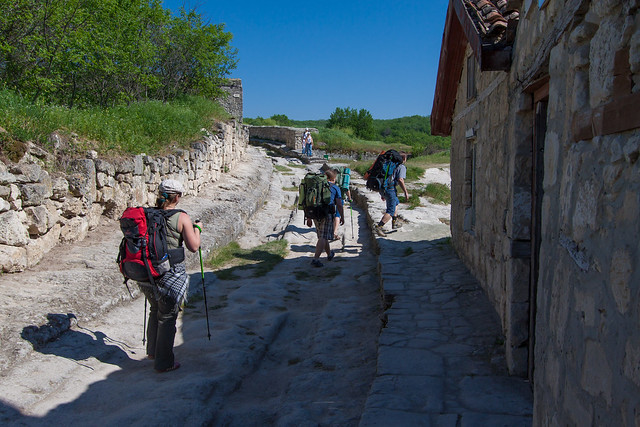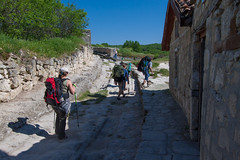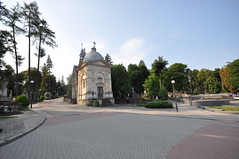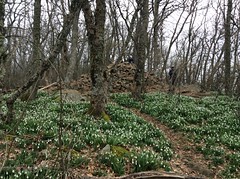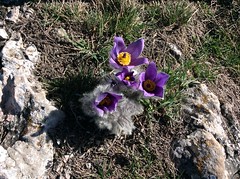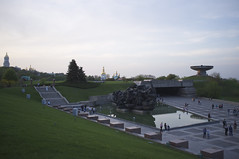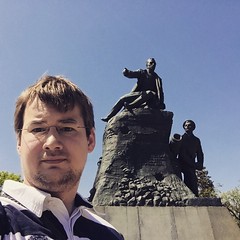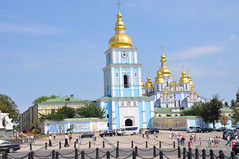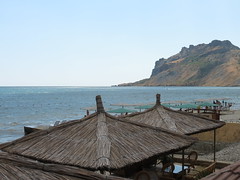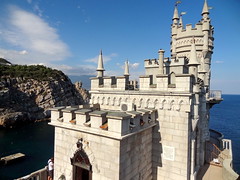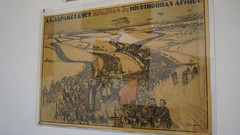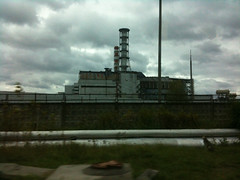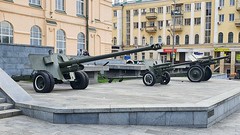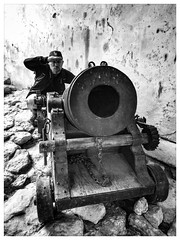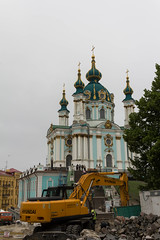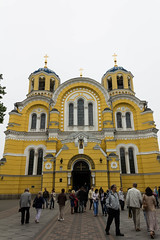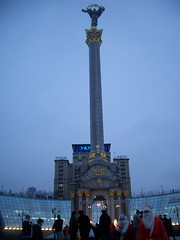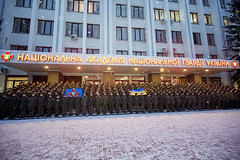 Ukraine
Ukraine
Ukraine (Ukrainian: Україна, Ukrainian: [ʊkrɐˈjinɐ]) is a country in Eastern Europe. It is the second-largest European country after Russia, which it borders to the east and northeast. It is also bordered by Belarus to the north; by Poland, Slovakia, and Hungary to the west; and by Romania and Moldova to the southwest; with a coastline along the Black Sea and the Sea of Azov to the south and southeast. Kyiv is the nation's capital and largest city. Ukraine's state language is Ukrainian; Russian is also widely spoken, especially in the east and south.
During the Middle Ages, Ukraine was the site of early Slavic expansion and the area later became a key centre of East Slavic culture under the state of Kievan Rus', which emerged in the 9th century. The state eventually disintegrated into rival regional powers and was ultimately destroyed by the Mongol invasions of the 13th century. The area was then contested, divided, and ruled by a variety of external powers for the next 600 years, including the Polish–Lithuanian Commonwealth, the Austrian Empire, the Ottoman Empire, and the Tsardom of Russia. The Cossack Hetmanate emerged in central Ukraine in the 17th century, but was partitioned between Russia and Poland, and ultimately absorbed by the Russian Empire. Ukrainian nationalism developed, and following the Russian Revolution in 1917, the short-lived Ukrainian People's Republic was formed. The Bolsheviks consolidated control over much of the former empire and established the Ukrainian Soviet Socialist Republic, which became a constituent republic of the Soviet Union when it was formed in 1922. In the early 1930s, millions of Ukrainians died in the Holodomor, a man-made famine. The German occupation during World War II in Ukraine was devastating, and seven million Ukrainian civilians were killed, including the majority of Ukrainian Jews.
Ukraine gained independence in 1991 as the Soviet Union dissolved, and declared itself neutral. A new constitution was adopted in 1996. A series of mass demonstrations, known as the Euromaidan, led to the establishment of a new government in 2014 after a revolution. Russia then unilaterally annexed Ukraine's Crimean Peninsula; and pro-Russian unrest culminated in a war in the Donbas between Russian-backed separatists and government forces in eastern Ukraine. Russia launched a full-scale invasion of Ukraine in February 2022. Since the outbreak of war with Russia, Ukraine has continued to seek closer ties with the United States, European Union, and NATO.
Ukraine is a unitary state with a semi-presidential system. Although a developing country it is the poorest country in Europe by nominal GDP per capita, and corruption remains a significant issue. However, due to its extensive fertile land, pre-war Ukraine was one of the largest grain exporters in the world. It is a founding member of the United Nations, as well as a member of the Council of Europe, the World Trade Organization, and the OSCE. It is in the process of joining the European Union and has submitted an application for NATO membership.
Etymology and orthography
The name of Ukraine likely comes from the old Slavic term for "borderland", as does the word krajina.
In the English-speaking world during most of the 20th century, Ukraine (whether independent or not) was referred to as "the Ukraine". This is because the word ukraina means "borderland" so the definite article would be natural in the English language; this is similar to "", which means "low lands" and is rendered in English as "the Netherlands". However, since Ukraine's declaration of independence in 1991, this usage has become politicised and is now rarer, and style guides advise against its use. US ambassador William Taylor said that using "the Ukraine" implies disregard for Ukrainian sovereignty. The official Ukrainian position is that "the Ukraine" is both grammatically and politically incorrect.
History
Early history
Settlement by modern humans in Ukraine and its vicinity dates back to 32,000 BC, with evidence of the Gravettian culture in the Crimean Mountains. By 4,500 BC, the Neolithic Cucuteni–Trypillia culture was flourishing in wide areas of modern Ukraine, including Trypillia and the entire Dnieper-Dniester region. Ukraine is also considered to be the likely location of the first domestication of the horse. The Kurgan hypothesis places the Volga-Dnieper region of Ukraine and southern Russia as the linguistic homeland of the Proto-Indo-Europeans. Early Indo-European migrations from the Pontic steppes in the 3rd millennium BC spread Yamnaya Steppe pastoralist ancestry and Indo-European languages across large parts of Europe. During the Iron Age, the land was inhabited by Iranian-speaking Cimmerians, Scythians, and Sarmatians. Between 700 BC and 200 BC it was part of the Scythian kingdom.
From the 6th century BC, Greek, Roman, and Byzantine colonies were established on the north-eastern shore of the Black Sea, such as at Tyras, Olbia, and Chersonesus. These thrived into the 6th century AD. The Goths stayed in the area, but came under the sway of the Huns from the 370s. In the 7th century, the territory that is now eastern Ukraine was the centre of Old Great Bulgaria. At the end of the century, the majority of Bulgar tribes migrated in different directions, and the Khazars took over much of the land.
In the 5th and 6th centuries, the early Slavic Antes people lived in Ukraine. Migrations from the territories of present-day Ukraine throughout the Balkans established many South Slavic nations. Northern migrations, reaching almost to Lake Ilmen, led to the emergence of the Ilmen Slavs, Krivichs, and Radimichs. Following an Avar raid in 602 and the collapse of the Antes Union, most of these peoples survived as separate tribes until the beginning of the second millennium.
Golden Age of Kyiv
The establishment of the state of Kievan Rus' remains obscure and uncertain. The state included much of present-day Ukraine, Belarus and the western part of European Russia. According to the Primary Chronicle, the Rus' people initially consisted of Varangians from Scandinavia. In 882, the pagan Prince Oleg (Oleh) conquered Kyivfrom Askold and Dir and proclaimed it as the new capital of the Rus'. Anti-Normanist historians however argue that the East Slavic tribes along the southern parts of the Dnieper River were already in the process of forming a state independently. The Varangian elite, including the ruling Rurik dynasty, later assimilated into the Slavic population. Kievan Rus' was composed of several principalities ruled by the interrelated Rurikid kniazes ("princes"), who often fought each other for possession of Kyiv.
During the 10th and 11th centuries, Kievan Rus' became the largest and most powerful state in Europe, a period known as its Golden Age. It began with the reign of Vladimir the Great (980–1015), who introduced Christianity. During the reign of his son, Yaroslav the Wise (1019–1054), Kievan Rus' reached the zenith of its cultural development and military power. The state soon fragmented as the relative importance of regional powers rose again. After a final resurgence under the rule of Vladimir II Monomakh (1113–1125) and his son Mstislav (1125–1132), Kievan Rus' finally disintegrated into separate principalities following Mstislav's death, though ownership of Kyiv would still carry great prestige for decades. In the 11th and 12th centuries, the nomadic confederacy of the Turkic-speaking Cumans and Kipchaks was the dominant force in the Pontic steppe north of the Black Sea.
The Mongol invasions in the mid-13th century devastated Kievan Rus', and Kyiv was completely destroyed in 1240. In the western territories, the principalities of Halych and Volhynia had arisen earlier, and were merged together to form the Principality of Galicia–Volhynia. Daniel of Galicia, son of Roman the Great, re-united much of south-western Rus', including Volhynia, Galicia, as well as Kyiv. He was subsequently crowned by a papal envoy as the first king of Galicia–Volhynia (also known as the Kingdom of Ruthenia) in 1253.
Foreign domination
In 1349, in the aftermath of the Galicia–Volhynia Wars, the region was partitioned between the Kingdom of Poland and the Grand Duchy of Lithuania. From the mid-13th century to the late 1400s, the Republic of Genoa founded numerous colonies on the northern coast of the Black Sea and transformed these into large commercial centers headed by the consul, a representative of the Republic. In 1430, the region of Podolia was incorporated into Poland, and the lands of modern-day Ukraine became increasingly settled by Poles. In 1441, Genghisid prince Haci I Giray founded the Crimean Khanate on the Crimean Peninsula and the surrounding steppes; the Khanate orchestrated Tatar slave raids. Over the next three centuries, they would enslave an estimated two million in the region.
In 1569, the Union of Lublin established the Polish–Lithuanian Commonwealth, and most of the Ukrainian lands were transferred from Lithuania to the Crown of the Kingdom of Poland, becoming de jure Polish territory. Under the pressures of Polonisation, many landed gentry of Ruthenia converted to Catholicism and joined the circles of the Polish nobility; others joined the newly created Ruthenian Uniate Church.
Cossack Hetmanate
Deprived of native protectors among the Ruthenian nobility, the peasants and townspeople began turning for protection to the emerging Zaporozhian Cossacks. In the mid-17th century, a Cossack military quasi-state, the Zaporozhian Host, was formed by Dnieper Cossacks and Ruthenian peasants. Poland exercised little real control over this population, but found the Cossacks to be useful against the Turks and Tatars, and at times the two were allies in military campaigns. However, the continued harsh enserfment of Ruthenian peasantry by Polish szlachta (many of whom were Polonized Ruthenian nobles) and the suppression of the Orthodox Church alienated the…
Looking for places related to Ukraine?
Those are other destinations to find places related to Ukraine:
